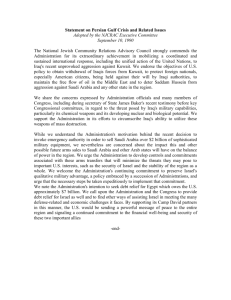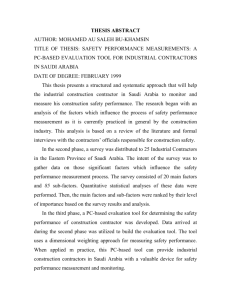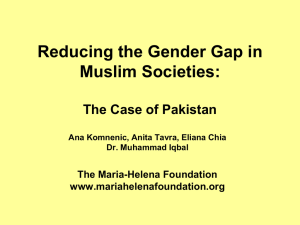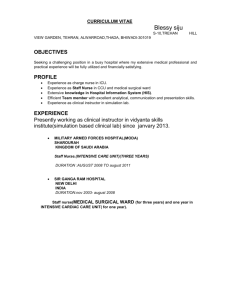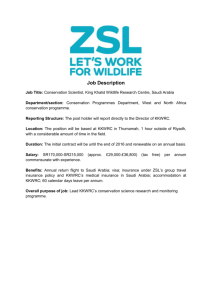Document #1 Essay Question: Describe the different
advertisement
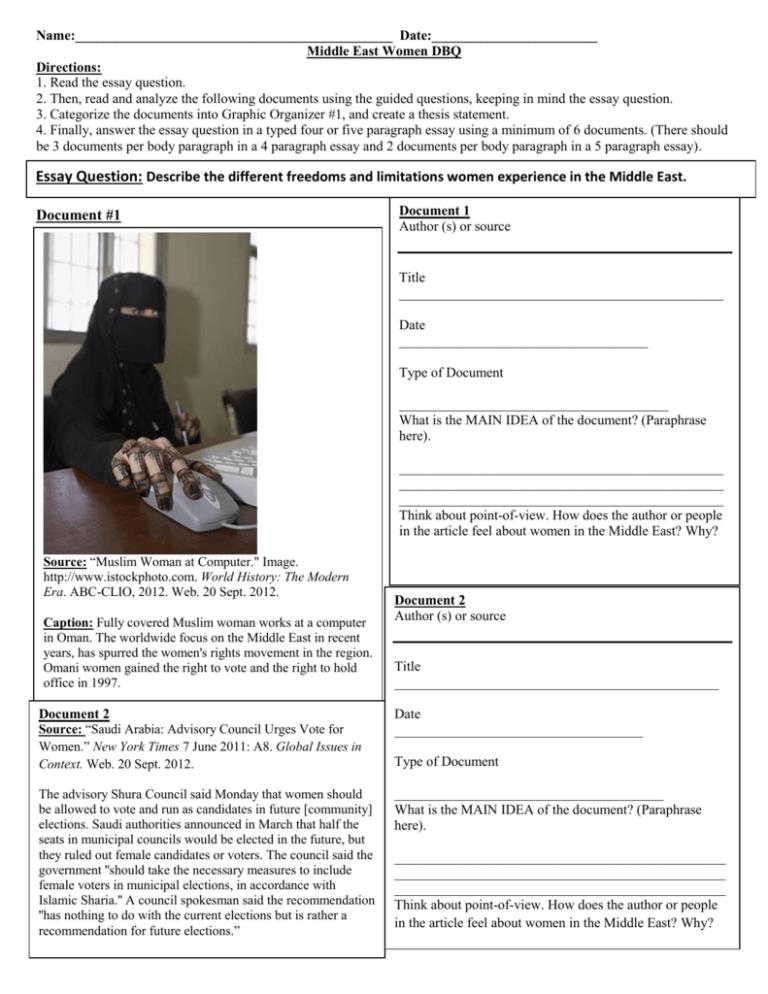
Name:______________________________________________ Date:________________________ Middle East Women DBQ Directions: 1. Read the essay question. 2. Then, read and analyze the following documents using the guided questions, keeping in mind the essay question. 3. Categorize the documents into Graphic Organizer #1, and create a thesis statement. 4. Finally, answer the essay question in a typed four or five paragraph essay using a minimum of 6 documents. (There should be 3 documents per body paragraph in a 4 paragraph essay and 2 documents per body paragraph in a 5 paragraph essay). Essay Question: Describe the different freedoms and limitations women experience in the Middle East. Document #1 Document 1 Author (s) or source Title _______________________________________________ Date ____________________________________ Type of Document _______________________________________ What is the MAIN IDEA of the document? (Paraphrase here). _______________________________________________ _______________________________________________ _______________________________________________ Think about point-of-view. How does the author or people in the article feel about women in the Middle East? Why? Source: “Muslim Woman at Computer." Image. http://www.istockphoto.com. World History: The Modern Era. ABC-CLIO, 2012. Web. 20 Sept. 2012. Caption: Fully covered Muslim woman works at a computer in Oman. The worldwide focus on the Middle East in recent years, has spurred the women's rights movement in the region. Document 2 Omani women gained the right to vote and the right to hold office in 1997. Document 2 Author (s) or source Title _______________________________________________ Document 2 Source: “Saudi Arabia: Advisory Council Urges Vote for Women.” New York Times 7 June 2011: A8. Global Issues in Context. Web. 20 Sept. 2012. Date ____________________________________ The advisory Shura Council said Monday that women should be allowed to vote and run as candidates in future [community] elections. Saudi authorities announced in March that half the seats in municipal councils would be elected in the future, but they ruled out female candidates or voters. The council said the government ''should take the necessary measures to include female voters in municipal elections, in accordance with Islamic Sharia.'' A council spokesman said the recommendation ''has nothing to do with the current elections but is rather a recommendation for future elections.” _______________________________________ What is the MAIN IDEA of the document? (Paraphrase here). Type of Document ________________________________________________ ________________________________________________ ________________________________________________ Think about point-of-view. How does the author or people in the article feel about women in the Middle East? Why? Document 3 Source: Heather Sharp, “Dubai Women Storm World of Work,” BBC News, 2 Aug. 2005. Document 3 Author (s) or source “With the job opportunities of a booming economy, a government drive to empower and educate women and exposure to other cultures, Dubai's [located in the UAE] women are moving in increasing numbers into a wide range of professions. The newspapers proudly tout the achievements of women firefighters, police officers, [and] business leaders. Among UAE nationals it is generally considered inappropriate for women to speak to men they are neither married nor related to in public. All government universities are single-sex. But contact with male work colleagues is increasingly seen as acceptable. Amna Mazam, a UAE national, is a student counselor at Dubai Women's College. She says 50-60% of their 2,300 students are likely to continue into employment. The majority of the others do not work because of pressure from their parents or husbands, she says, although some choose to stay at home to raise children full time. However, among Dubai students I meet a stream of highly ambitious, determined young women with supportive families. Several, like business marketing student Maria Hanif Qassimi, 20, say they would refuse to marry a man who would not allow them to work. "I've worked very hard to have a career, and I don't want to just blow it off," she said. Few, like IT graduate Salama, would accept a future husband's demands to stay at home: "It's our religion - what he says, I must do," she says. Others like Bushra Mohammed Roken, 19, the leader of the student council at Zayed University, would work around such views…If he doesn't want me to go out, it's not like I'm in prison, because I could set up my own business from home..." Title _______________________________________________ Date ____________________________________ Type of Document _______________________________________ What is the MAIN IDEA of the document? (Paraphrase here). ___________________________________________________ ___________________________________________________ ___________________________________________________ ___________________________________________________ Think about point-of-view. How does the author or people in the article feel about women in the Middle East? Why? Document 4 Author (s) or source Title _______________________________________________ Date ____________________________________ Document 4 Type of Document Source: Embassy of the United Arab Emirates, “Women in the UAE,” UAE Embassy, 18 April 2013. _______________________________________ What is the MAIN IDEA of the document? (Paraphrase here). “The Constitution of the UAE guarantees equal rights for both men and women. Under the Constitution, women enjoy the same legal status, claim to titles, access to education and the right to practice professions as men. They are also guaranteed the same access to employment, health and family welfare facilities. The rights of women to inherit property are also guaranteed and ensured.” ___________________________________________________ ___________________________________________________ ___________________________________________________ ___________________________________________________ ___________________________________________________ Think about point-of-view. How does the author or people in the article feel about women in the Middle East? Why? Document 5 Source: Mohammed Jamjoom and Laura Smith-Spark, “Saudi Arabia Women Defy Authorities over Female Driving Ban,” CNN, 26 October 2013. “In an extraordinary display of civil disobedience, women in Saudi Arabia on Saturday defied their nation's…ban on women driving by getting behind the steering wheel. After a campaign for change gathered pace on social media, numerous women filmed themselves behind the wheel Saturday in various cities and uploaded those videos to YouTube. Several Saudi supporters of the October 26th Women's Driving Campaign told CNN that at least 25 women drove Saturday. Authorities stopped five women who were spotted driving in the Saudi capital and "each case was dealt with accordingly," Col. Fawaz Al-Meeman of Riyadh police told CNN. Al-Meeman, an assistant spokesman for that city's police department, explained that the women weren't taken to police stations. Instead, they were kept in their vehicles until their male guardians arrived, at which point the women were released after signing pledges not to drive again…” Document #6 Document 5 Author (s) or source Title _______________________________________________ Date ____________________________________ Type of Document _______________________________________ What is the MAIN IDEA of the document? (Paraphrase here). ________________________________________________ ________________________________________________ ________________________________________________ Think about point-of-view. How does the author or people in the article feel about women in the Middle East? Why? Source Citation: “The Global Gender Gap Report,” World Economic Forum, 2011. Kuwait’s Gender Gap Index Scores Document 6 Author (s) or source Title _______________________________________________ Date _____________________________________________ Type of Document _______________________________________________ What is the MAIN IDEA of the document? (Paraphrase here). ___________________________________________________________________________________________________ ___________________________________________________________________________________________________ ___________________________________________________________________________________________________ Document 7 Source: United Nations Educational, Scientific and Cultural Organization (UNESCO) Institute for Statistics, "Literacy Statistics" (www.uis.unesco.org, accessed March 11, 2003). Literacy Rates Among Young Women in Selected Countries, 1970-2000 Document 7 Author (s) or source Title _______________________________________________ Date ____________________________________ Type of Document _______________________________________ What is the MAIN IDEA of the document? (Paraphrase here). __________________________________________________ __________________________________________________ __________________________________________________ __________________________________________________ Document 8 Author (s) or source Title _______________________________________________ Document 8 Source: Katy Watson, “Dubai Dress Code: ‘Cover up,’ UAE Women Tell Foreigners,” BBC News, 5 July 2012. “Fed up with what's seen as a lack of respect for the local culture, two young Emirati women started a twitter campaign called #UAEDressCode, urging foreigners to cover up in public places. And hundreds of people have weighed in - with one tweet suggesting setting up a police department where you could complain about inappropriate clothing. "An extra few inches of cloth won't kill you," said another. Twentythree-year-old Asma started the campaign with a friend. Greeting me, and wearing a low-cut tunic and leggings in the privacy of her own home, she told me why she got involved. "The way some people dress here is offensive to our beliefs," she told me. "Malls are public places and there are families and children." A sundress, she says, is good for a beach, but not for shopping. All the malls here have notices at the entrances asking shoppers to cover their shoulders and knees but Asma says that is not enough. She wants a law to be introduced to ensure the dress code is adhered to…” Date ____________________________________ Type of Document _______________________________________ What is the MAIN IDEA of the document? (Paraphrase here). __________________________________________________ __________________________________________________ __________________________________________________ __________________________________________________ Think about point-of-view. How does the author or people in the article feel about women in the Middle East? Why? Document 9 Source: “Leaders Hail Kuwait Women’s Votes.” BBC News, 17 May 2005. Document 9 Author (s) or source “The United States and the United Nations have both welcomed Kuwait's decision to give full political rights to women as an important advance…The result, announced by the speaker of parliament, was greeted with thunderous applause from the public gallery where backers of the amendment were gathered. Outside, drivers hooted their horns, people danced and cheered and lit fireworks. "We made it. This is history," said suffrage activist Roula Dashti."Our target is the parliamentary polls in 2007. I'm starting my campaign from today." Islamist MPs [Members of Parliament], who foiled past suffrage moves, added a clause on Monday saying women must abide by Islamic law when voting and campaigning…Some Islamists accused the government of pressurizing MPs to pass the amendment to the electoral law, saying the change goes against religious teaching and serves US interests. Kuwait becomes the fourth Gulf country where women as well as men can vote in elections after Bahrain, Oman and Qatar. Saudi Arabia holds strictly limited, male-only elections. "Thank God we finished with this issue," Prime Minister Sheikh Sabah al-Ahmad al-Sabah said. "I want our womenfolk to help us build our beloved country and our future." Title _______________________________________________ Document 10 Source: “Viewpoint: Saudi Women Should Not Drive,” BBC News, 3 October 2011. The vast majority of women do not drive in [Saudi Arabia] and there remains much opposition to female drivers. A 25-year-old Saudi man, Nawwaf, told BBC Radio 4's World at One program why he does not want to see women driving in Saudi Arabia. "I think women driving is the key to a lot of things. In Western countries, 100 years ago women's clothes were different but now you can see they are a little bit naked. "If you start now to let women drive, let them go wherever they want, let them do whatever they want, we will be in the same position some day. Then Saudi Arabia will be like New York. "It's not good for some girl to show her body, wear very short skirts. This is not about Saudi Arabia, it's about Islam. We've got a generation who were raised watching Gossip Girls and other [similar] series. They only want to be like that, dress like that, drive like that. It's not about need. "Now it's driving [women want]. After five years it will be taking off the abaya [all-covering veil and gown], after 10 years they will ask to be allowed to wear short skirts. This is how it's going, that is how I feel…” Date ____________________________________ Type of Document _______________________________________ What is the MAIN IDEA of the document? (Paraphrase here). __________________________________________________ __________________________________________________ __________________________________________________ __________________________________________________ Think about point-of-view. How does the author or people in the article feel about women in the Middle East? Why? Document 10 Author (s) or source Title _______________________________________________ Date ____________________________________ Type of Document _______________________________________ What is the MAIN IDEA of the document? (Paraphrase here). __________________________________________________ __________________________________________________ __________________________________________________ __________________________________________________ Think about point-of-view. How does the author or people in the article feel about women in the Middle East? Why?


